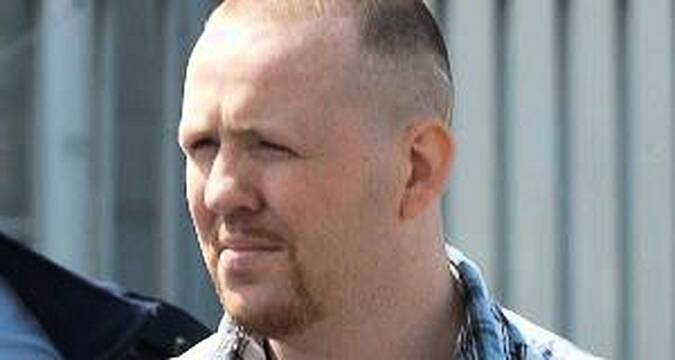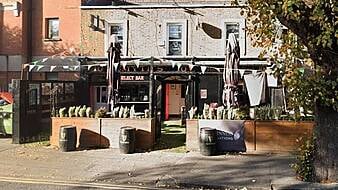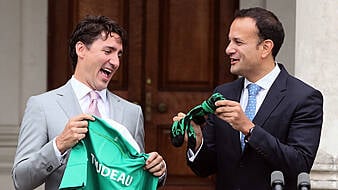Over 16 years after innocent rugby player Shane Geoghegan was shot dead in a case of mistaken identity, the notorious Limerick gangster who ordered the hit, John Dundon, has failed in a bid to overturn his murder conviction.
The Court of Appeal on Thursday rejected Dundon's claims that evidence which "fell through the cracks" could have called the credibility of witnesses into question.
Dundon (41) formerly of Hyde Road in Limerick, was convicted at the Special Criminal Court in 2013 of ordering the hit that resulted in the death of 28-year-old Mr Geoghegan near the victim's home at Clonmore, Kilteragh, Dooradoyle on November 9th, 2008. He is serving a life sentence.
Key State witness April Collins had told the court that she heard John Dundon order gunman Barry Doyle to kill a gang rival less than 48 hours before Mr Geoghegan’s death. The court heard that April Collins was previously in a relationship with John’s brother, Gerard Dundon, for eight years and had three children by him.
Mr Geoghegan played rugby for Garryowen in Limerick and had been watching an Ireland international game at a friend's house before heading home shortly before 1am. He had just texted his girlfriend Jenna Barry to say he was on his way when Ms Barry heard shots fired outside. Mr Geoghegan was shot five times with a Glock semi-automatic pistol. The fatal shot was to the back of the head.
It was the State’s case that Mr Geoghegan was the unintended victim of a shooting that was meant for another man and was ordered by John Dundon.
Launching an appeal against the conviction in April last, counsel for Dundon, Dominic McGinn SC argued that the court should hear fresh evidence of a phone conversation between witnesses Lisa Collins and Christopher McCarthy that did not emerge at Dundon's trial in 2013. Mr McGinn said that during the conversation, which was recorded by the Irish Prison Service while Mr McCarthy was in jail, Ms Collins and Mr McCarthy discussed "how long was long enough" for Dundon to be imprisoned.
Counsel said there was a reference to Dundon receiving 10 years for a particular offence but that "wouldn't be sufficient". Mr McGinn said the conversation suggested that Ms Collins and Mr McCarthy had a motive to ensure that Dundon was convicted of an offence carrying a greater penalty, such as murder.
If Dundon's legal team at the time had known about the conversation, Mr McGinn said they undoubtedly would have used it to undermine the credibility of Mr McCarthy, Lisa Collins and her sister April Collins.
Evidence
Those three gave evidence detailing how John Dundon ordered and organised the hit that resulted in Mr Geoghegan being shot in a case of mistaken identity.
The Special Criminal Court, where Dundon was tried in 2013, found that their evidence was credible.
Mr McGinn said Dundon's original legal team was aware of the phone call but the evidence later "fell through the cracks" after Dundon sacked his lawyers on the day his trial was due to begin. His second legal team, Mr McGinn said, had to deal with a huge amount of disclosure in a short amount of time.
The absence of the phone call evidence was enough to raise a concern about the fairness of Dundon's trial, Mr McGinn said.
In delivering the Court of Appeal’s ruling today, Mr Justice John Edwards noted that senior counsel for the appellant had asked the court to accept that the material at issue was relevant and its absence gave rise to a concern that the appellant did not have a fair trial or that his conviction might not be safe.
Mr Justice Edwards said that this matter was not pursued by the appellant’s new legal team at trial, who claimed that they had limited time to prepare.
However, Mr Justice Edwards said that there was no evidence that this was the reason for their failure to pursue the issue, adding that there was no basis for drawing any inference as to their reasons.
No breach of disclosure
He said that at the time disclosure of the telephone transcripts was sought, the material was not in the possession or procurement of the DPP, who was not under any obligation to provide it by way of disclosure. The judge said there was no breach of the duty of disclosure owed by the DPP to the appellant.
“There was a great deal of evidence of fear of the Dundons, including of the appellant, and of grounds for resentment towards them, on the part of the three controversial witnesses whose conversations were captured,” said Mr Justice Edwards.
The judge went on to say that the court did not see how the defence having the transcripts in time for the trial would have further assisted them in undermining the witnesses.
He pointed out that the Special Criminal Court approached the testimony of these witnesses with great caution and warned itself of relying on their uncorroborated testimony, even though there was a good deal of evidence to corroborate their testimony.
Finding the court was not persuaded that the appellant’s trial was unsatisfactory or his verdict unsafe, the judge said it would dismiss the appeal.
In April this year, Dundon was accused of engaging in a "cynical ploy" after he sacked his lawyers and asked for an adjournment of his appeal against the conviction.
Dundon told the Court of Appeal that he discharged his lawyers after discovering that they were unable to advance a ground of appeal that the appellant said had been identified in recent months. The three judges of the court granted an application for Dundon's then lawyers to withdraw from the case.
New lawyers came on the record for Dundon, who was granted free legal aid and whose appeal eventually went ahead later that month.
Both the Special Criminal Court and the High Court had previously rejected bids by Dundon to have his 2013 murder trial adjourned. However in June 2013, the Special Criminal Court ruled the murder trial should not proceed until the adjournment application came before the Supreme Court.
Garda interviews
On that occasion, Dundon had appeared in the Special Criminal Court wearing only a pair of dark-coloured shorts, having been admitted to hospital after going on hunger strike for at least a week and refusing fluids for a number of days.
The trial was delayed until July 2nd, 2013, when the opening day saw a gaunt, wheelchair-using Dundon taken to hospital for a head injury. He had earlier informed the court that he was illiterate in response to evidence that he had sacked his legal team and elected to represent himself. The trial eventually opened the next day.
Barry Doyle (38) admitted during Garda interviews that he shot Mr Geoghegan in a case of mistaken identity.
However, Doyle, of Portland Row in Dublin 1, later pleaded not guilty at trial to the murder of Mr Geoghegan. He was found guilty by a jury at the Central Criminal Court and was given the mandatory life sentence by Mr Justice Garrett Sheehan on February 16th, 2012.







